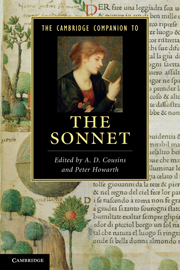Book contents
- Frontmatter
- Introduction
- 1 Contemporary poets and the sonnet
- 2 The sonnet and the lyric mode
- 3 The sonnet, subjectivity and gender
- 4 The English sonnet in manuscript, print and mass media
- 5 European beginnings and transmissions
- 6 Desire, discontent, parody
- 7 Shakespeare’s Sonnets
- 8 Sacred desire, forms of belief
- 9 Survival and change: the sonnet from Milton to the Romantics
- 10 The Romantic sonnet
- 11 The Victorian sonnet
- 12 The modern sonnet
- 13 The contemporary sonnet
- Further reading
- Index
8 - Sacred desire, forms of belief
religious sonnet in early modern Britain
Published online by Cambridge University Press: 28 May 2011
- Frontmatter
- Introduction
- 1 Contemporary poets and the sonnet
- 2 The sonnet and the lyric mode
- 3 The sonnet, subjectivity and gender
- 4 The English sonnet in manuscript, print and mass media
- 5 European beginnings and transmissions
- 6 Desire, discontent, parody
- 7 Shakespeare’s Sonnets
- 8 Sacred desire, forms of belief
- 9 Survival and change: the sonnet from Milton to the Romantics
- 10 The Romantic sonnet
- 11 The Victorian sonnet
- 12 The modern sonnet
- 13 The contemporary sonnet
- Further reading
- Index
Summary
Introduction
In 1560, a new poetic voice was heard in London with the publication of A Meditation of a Penitent Sinner, appended to Sermons of John Calvin, upon the Songe that Ezechias made. This Meditation introduced the religious sonneteer into English-speaking culture, presenting a strong persona with a paradoxically ‘febled sprite’, ‘daseld’ by the ‘lothesome filthe’ of a sinful life lived under the threat of God’s ‘mighty wrath’. 1 The opening poem announces the tone of the sequence as passionate and insistent, with a manner modelled on the penitential Psalms but crafted into the form of an English sonnet :
Have mercy, God, for thy great mercies sake.
O God: my God, unto my shame I say,
Beynge fled from thee, so as I dred to take
Thy name in wretched mouth, and feare to pray
Or aske the mercy that I have abusde.
But, God of mercy, let me come to thee:
Not for justice, that justly am accusde:
Which selfe word Justice so amaseth me,
That scarce I dare thy mercy sound againe,
But mercie, Lord, yet suffer me to crave.
Mercie is thine: Let me not crye in vaine,
Thy great mercie for my great fault to have.
Have mercie, God, pitie my penitence
With greater mercie than my great offence.
These pleading lines, based on Psalm 51:1, encapsulate the mood of much early modern devotional verse: the desperate desire for forgiveness (highlighted in the repeated use of the word ‘mercy’), the urge to address God while simultaneously feeling unworthy to take his name into a sinner’s ‘wretched mouth’, the consequent paralyzing mixture of hope and dread, the perpetual circling of justice and mercy at odds with one another, and finally the ‘greater’ mercy required to redeem the speaker’s ‘great offence’.
- Type
- Chapter
- Information
- The Cambridge Companion to the Sonnet , pp. 145 - 165Publisher: Cambridge University PressPrint publication year: 2011



